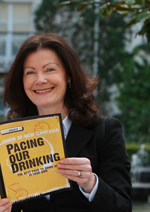UK report seeks stronger penalties for adults purchasing ‘underage’ alcohol

A UK report from think-tank Demos entitled Sobering Up seeks tougher punishments for parents, friends and older siblings who ‘proxy-purchase’ alcohol in order to tackle harmful underage drinking in the UK.
22 November 2013
People who buy alcohol on behalf of underage drinkers should face community service, social shaming or be banned from shops, according to the report’s authors Jonathan Birdwell, Ian Wybron and Emma Vandore.
Their report encourages police and local authorities to use the threat of tougher punishments to discourage proxy-purchasing. It argues community service with a strong focus on alcohol-related work, such as clearing up city centres in the morning, would be a justifiable penalty. Other ideas include banning people from their local off licence or even prominently displaying posters by the counter to ‘name and shame’ those caught breaking the law.
Demos goes on to argue police should do more to both enforce on-the-spot fines for law breakers as well as using their powers to prosecute those potentially causing a great deal of harm by enabling underage drinkers.
While the current on-the-spot fine is just £90, police potentially have the ability to impose a maximum fine of £5,000 for people convicted for purchasing alcohol on behalf of a child. However, recent health select committee figures show that only 16 people were successfully prosecuted in a four-year span.
The report cites Portsmouth as the first local authority to introduce a ‘Proxywatch’ scheme – a 24-hour hotline for members of the public and shop staff to report incidences of proxy-purchasing. An important part of this campaign is raising awareness amongst retailers, which has helped see the test-purchase failure rate for alcohol and tobacco fall from 33% to 2.5% in just four years.
Following the publication of the Demos report which criticised adults who ‘enable’ teen drinking, MEAS Chief Executive Fionnuala Sheehan pointed out that, “It’s clear from the most recent (2011) European School Survey Project on Alcohol and Other Drugs figures for Ireland, that although fewer 16 year-olds now drink alcohol, its perceived availability still remains at a high level.
“The Demos report also highlights the important influence of parents in providing alcohol to children and on children’s attitudes and behaviours towards alcohol,” she added, “We know that some parents provide alcohol to older children in a belief that introducing alcohol in the home is a good way to teach young people about responsible drinking. However, the evidence shows that it is best to delay the commencement of drinking as young people who start drinking at an early age, drink more and more frequently than those who delay their first alcoholic drink. An alcohol free childhood is best.
“ESPAD data suggests that Irish teens access much of the alcohol that they consume in their homes or friends’ homes, or that they find other people to purchase it for them.”
Figures cited by the UK report include those from the Health & Social Care Information Centre which found that one-third of 11-15 year olds (33%) admitted obtaining alcohol in the previous four weeks. One in five (19%) were given the alcohol by parents, whilst the same percentage also said they had received it from their friends.
Around one in seven teenagers (13%) had also asked someone else to buy alcohol for them, compared with only 3% who had illegally purchased it from a shop themselves.
By contrast, The European School Survey Project on Alcohol and Other Drugs 2011 report (which aims to collect comparable data on substance use among teenagers in Europe at four-year intervals, providing valuable information on the behaviour of 15-16 year-olds) had found:? ?
- 84% of Irish 16 year-olds believed that alcohol would be “fairly easy” or “very easy” to obtain. This is higher than the 81% average recorded for all countries surveyed
- 50% of Irish 16 year-olds report drinking alcohol in the last 30 days, down from 73% in 2007 and lower than the 57% average for all 36 European countries surveyed
- ??37% of Irish 16 year-olds say that they purchased alcohol in a pub or disco ie in the “on trade” in the last 30 days.??
- 26% of Irish 16 year-olds say that they purchased alcohol in a shop, or the ‘off trade’, in the last 30 days
- The European average, in contrast, was 45% for on-trade purchases and 37% for off-trade purchases.
“It is encouraging to see that the percentage of underage purchases from on-trade and off-trade premises in Ireland is better than the European average,” concluded Fionnuala Sheehan, “It’s clear, however, that greater vigilance is required by licensees and staff and renewed action needed on adults purchasing alcohol for under-18s.? ?“I’d encourage all those involved to undertake training in responsible serving and selling of alcohol programmes to learn the skills and the strategies to counteract underage purchasing of alcohol. Our online briefing tool can be accessed free-of-charge and we aim to make the more comprehensive Responsible Serving of Alcohol Programme affordable by providing a subsidy to the programme deliverer.”
The Responsible Serving of Alcohol Programme is a more in-depth programme, developed by MEAS and supported by Fáilte Ireland. In the last decade more than 14,000 full-time hospitality sector employees completed the programme. It’s expected that 1,000 employees will have undertaken the RSA Programme in this calendar year.

“It is encouraging to see that the percentage of underage purchases from on-trade and off-trade premises in Ireland is better than the European average” — Fionnuala Sheehan.



 Print
Print








Fans 0
Followers